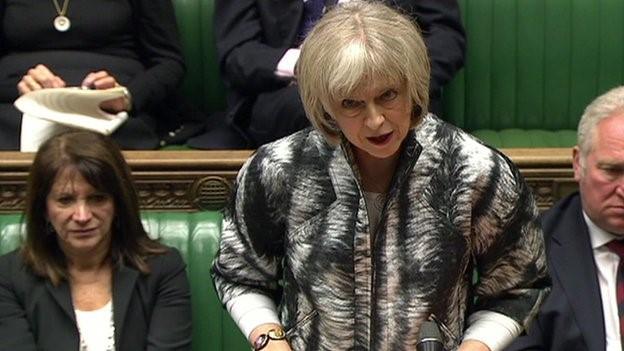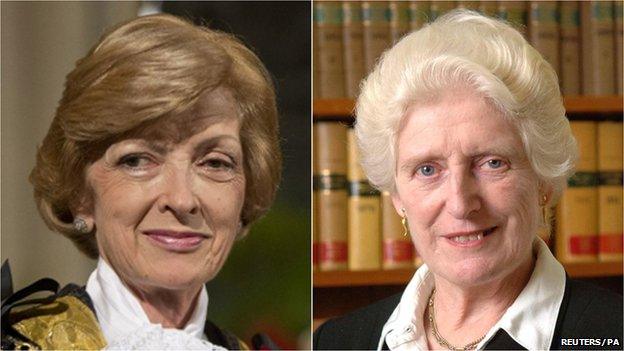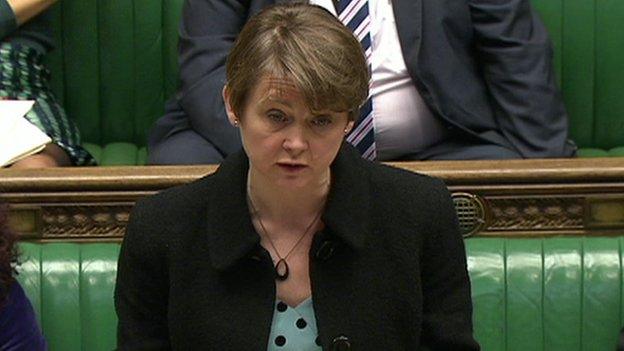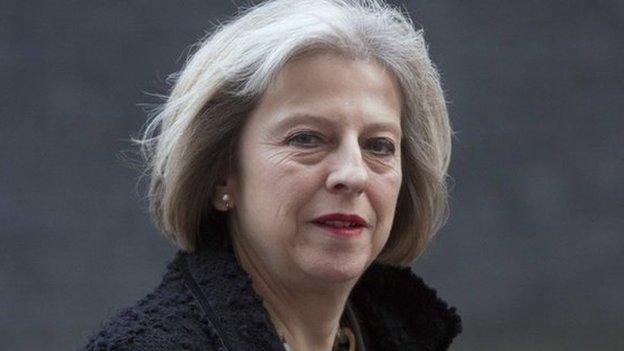Analysis: Conflict at heart of abuse inquiry panel
- Published

Theresa May has promised to make an announcement on the future of inquiry by the end of January
Home Secretary Theresa May has faced calls for an inquiry into historical child abuse, which has been beset by problems, to be "re-started". The inquiry, set up six months ago, remains without a leader, and there have been disagreements within the expert panel over its workings and its future.
Behind the scenes, there is now a bruising confrontation between the child abuse inquiry panel and one of its members, the children's charity founder Sharon Evans, who was herself abused as a child.
She is furious that the government plans to disband the panel, and redesign the structure of the entire inquiry.
Home Secretary Theresa May made clear the future of the inquiry will be announced within weeks.
Last month, the BBC was passed a leaked letter from Ms Evans to the home secretary in which Ms Evans said the panel had been assured it would continue for the duration of the inquiry.
She said that halting its work at this point "would send a very negative message to so many people we have already met and who we have promised they can have confidence in us to do the right thing".
She also claimed that at one of the panel's "listening" sessions with people who have been abused, allegations were made against an MP.

Fiona Woolf and Baroness Butler-Sloss have both stepped down from the role of inquiry chairwoman
Ms Evans then gave an interview to Channel Four News discussing her concerns about the future of the inquiry.
Sources with knowledge of the dispute within the panel have told the BBC this resulted in the counsel to the inquiry, Ben Emmerson QC, ordering her not to speak publicly about its work, without agreement from other panel members.
On Tuesday, Ms Evans told MPs on the Home Affairs Select Committee she felt "bullied and intimidated" by Mr Emmerson, adding, "I felt he was overstepping his mark."
She insists the panel should be defending itself against criticism, which in recent months has included allegations from survivors against at least two panel members.
She told the MPs that panellists had been "silenced" and, as a result, a myth had grown up among survivors that it was not working properly.
Ms Evans said: "We need to be able to speak openly. We haven't been able to answer the questions and allegations about individual panel members."
On Tuesday night, members of the panel released a statement: "The panel has full confidence in the integrity, advice and impartiality of counsel to the inquiry. We... do not accept any statements about bullying. We reject any suggestion that the panel has been intimidated."
The home office said it had investigated Ms Evans' bullying claims and found there to be nothing to substantiate them.
And Mr Emmerson said in a statement: "Sharon Evans has repeatedly disclosed confidential information in public and has made a number of public statements that are factually misleading. These were serious violations of her duties as a panel member and undermine the integrity of the inquiry and the confidence of victims and survivors."
'Wrong decisions'
A well-placed abuse inquiry source has told the BBC the other panel members feel they can no longer work with Ms Evans and would rather the government disband the panel now. In the meantime, they have suspended meetings with abuse survivors.
It is a row primarily about independence. The panel's members see their independence as collective. Ms Evans believes she should have the right to speak publicly, and personally if it is in the public interest - demonstrating, in effect, her independence from the panel itself.
The inquiry source also criticised the home office's handling of the inquiry saying that: "Every time there was a choice between the right decision and the wrong decision, home office officials picked the wrong one."
A key concern among abuse survivors has been the government's failure to consult on who should be on the panel, or to be transparent about the process used for picking its members.
The home secretary told the Commons on Thursday "due diligence" work was already under way on an individual presumably earmarked for the job of chairman.
All the existing panel members are expected to be told they will have to re-apply for their jobs. The question is how many will sit on the new panel.
Those who do could be in the job for some time. The panel source who spoke to the BBC believes the abuse inquiry will take at least five years.
- Published22 January 2015

- Published20 January 2015
